人教版七年级下册英语讲义(完整版)
- 格式:doc
- 大小:48.00 KB
- 文档页数:4
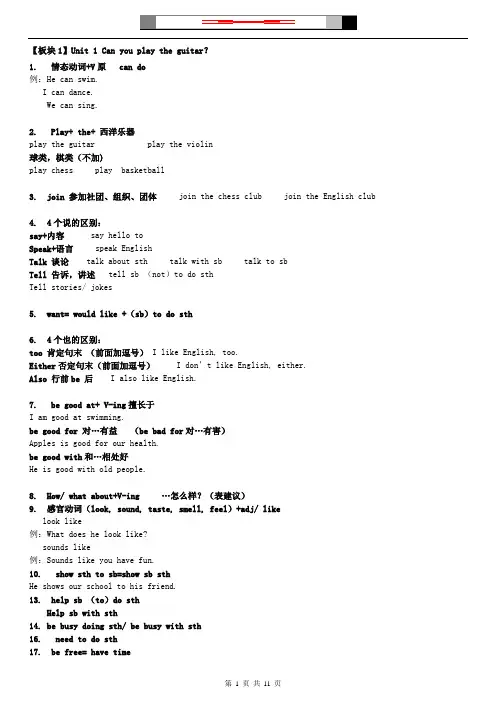
【板块1】Unit 1 Can you play the guitar?1.情态动词+V原 can do例:He can swim.I can dance.We can sing.2.Play+ the+ 西洋乐器play the guitar play the violin球类,棋类(不加)play chess play basketball3. join 参加社团、组织、团体 join the chess club join the English club4. 4个说的区别:say+内容 say hello toSpeak+语言 speak EnglishTalk 谈论 talk about sth talk with sb talk to sbTell 告诉,讲述 tell sb (not)to do sthTell stories/ jokes5. want= would like +(sb)to do sth6. 4个也的区别:too 肯定句末(前面加逗号) I like English, too.Either否定句末(前面加逗号) I don’t like English, either.Also 行前be 后 I also like English.7.be good at+ V-ing擅长于I am good at swimming.be good for 对…有益(be bad for对…有害)Apples is good for our health.be good with和…相处好He is good with old people.8. How/ what about+V-ing …怎么样?(表建议)9. 感官动词(look, sound, taste, smell, feel)+adj/ likelook like例:What does he look like?sounds like例:Sounds like you have fun.10.show sth to sb=show sb sthHe shows our school to his friend.13. help sb (to)do sthHelp sb with sth14. be busy doing sth/ be busy with sth16.need to do sth17. be free= have time18.make friends with19. call sb at +电话号码例:Call me at 1008620.on the weekend= on weekends21. English-speaking students 说英语的学生(带有连词符,有形容词性质)22. do kung fu表演功夫【课堂练习】一、单选:1( )How do you______this in English? A.speak B.say C.tell2( )Do you know a man_____Jack Smith? s d3( )-Do you know the way to the post office?-Yes,Follow me and I’ll______you the way(给你带路)A.callB.showsC.show4( )I can play______guitar,but I can’t play_____Chinese chess.A./,theB.the,aC.the,/5( )Can your father________Chinese?/Yes,she can____Chinese a little.A.speak,speaksB.say ,sayC.speak,speak6( )I need_______a song with you.A.to singB.singingC.sing7( )Tom can’t play the violin_____play chess.A.andB.butC.or8( )Our teacher told us________carefully in class.A.listenB.to listenC.listening9( )I can sing well, I want_______the music club..join B.to join C.joining10( )You sing well,You______a good musician when you grow up.A.maybeB.may beC.may11( )They often help kids________dancing.A.toB.atC.with.12( )I can_______Chinese Kongfu.A.playB.doC.make13( )He tells Jim_______to school on time.A.goB.to goC.goes14( )Victor is good_____singing,,and so he’s good_____the children in the music club.A.at,forB.with,forC.at,with15( )Please call Alan______053-765498.A.at.B.forC.on16( )Jim,can you_______this word in Chinese?/Yes,I can_______a little Chinese.A.speak,sayB.say,speakC.tell,speak17( )Sam can sing English songs________,but I can’t.A.very goodB.very muchC.very well.18( )Let’s______for a walk,shall we?A.to goB.goingC.go二、情景翻译1.你会弹吉他吗?不,我不会。
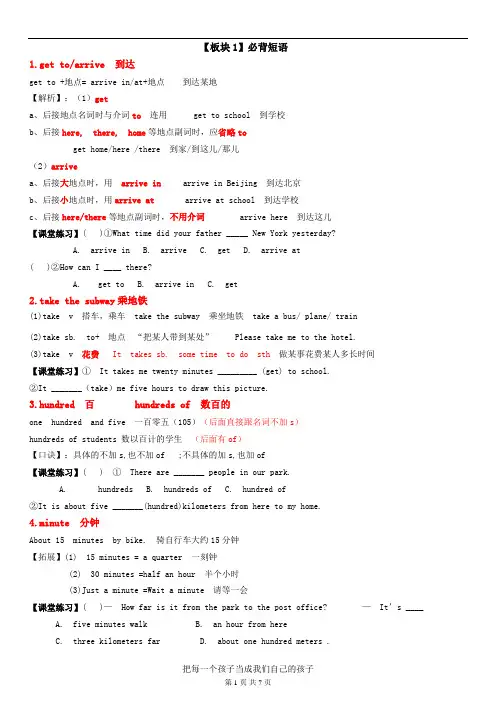
【板块1】必背短语1.get to/arrive 到达get to +地点= arrive in/at+地点到达某地【解析】:(1)geta、后接地点名词时与介词to 连用get to school 到学校b、后接here, there, home等地点副词时,应省略toget home/here /there 到家/到这儿/那儿(2)arrivea、后接大地点时,用arrive in arrive in Beijing 到达北京b、后接小地点时,用arrive at arrive at school 到达学校c、后接here/there等地点副词时,不用介词arrive here 到达这儿【课堂练习】( )①What time did your father _____ New York yesterday?A. arrive inB. arriveC. getD. arrive at( )②How can I ____ there?A.get toB. arrive inC. get2.take the subway乘地铁(1)take v 搭车,乘车take the subway 乘坐地铁 take a bus/ plane/ train(2)take sb. to+ 地点“把某人带到某处”Please take me to the hotel.(3)take v 花费 It takes sb. some time to do sth 做某事花费某人多长时间【课堂练习】①It takes me twenty minutes _________ (get) to school.②It _______(take)me five hours to draw this picture.3.hundred 百hundreds of 数百的one hundred and five 一百零五(105)(后面直接跟名词不加s)hundreds of students 数以百计的学生(后面有of)【口诀】:具体的不加s,也不加of ;不具体的加s,也加of【课堂练习】( ) ①There are _______ people in our park.A.hundredsB. hundreds ofC. hundred of②It is about five _______(hundred)kilometers from here to my home.4.minute 分钟About 15 minutes by bike. 骑自行车大约15分钟【拓展】(1) 15 minutes = a quarter 一刻钟(2) 30 minutes =half an hour 半个小时(3)Just a minute =Wait a minute 请等一会【课堂练习】( )—How far is it from the park to the post office? —It’s ____A. five minutes walkB. an hour from hereC. three kilometers farD. about one hundred meters .5.think of =think about 认为,想起What he think of the trip. 他对旅行有什么看法。

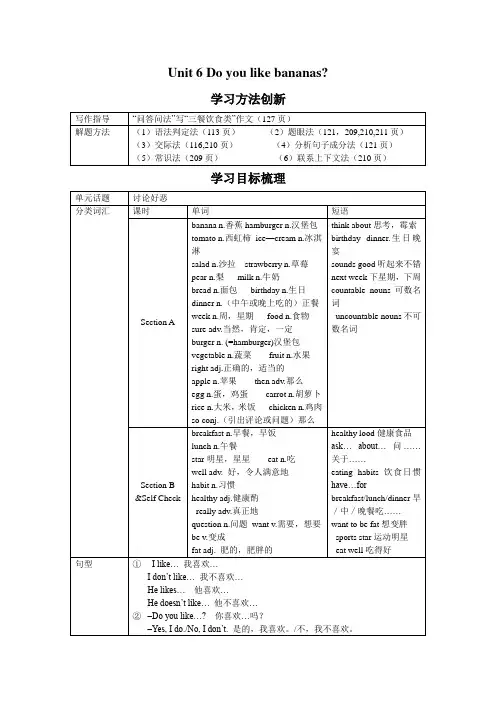
Unit 6 Do you like bananas?学习方法创新学习目标梳理单元语法精讲(一)可数名词与不可数名词英语中的名词可分为可数名词与不可数名词它们的定义、特点和用法的区别见下表:(1)固体的物资或原料eg: bread 面包rice大米(2)液体、气体等。
eg: water 水tea 茶air空气(3)语言。
eg: English 英语Chinese 汉语(4)一些抽象事物。
eg: knowledge 知识friendship 友谊魔法记忆:不可数名词记忆顺口溜:金木水火土,米面茶肉布,油盐糖酒醋,全部不可数。
对应的单词为:gold(金子),wood(女材),water(水),fire(火),mud(泥土),rice(米),flour(面粉),tea(茶),meat(肉),cloth(布),oil(油),salt(盐),sugar(糖),wine(酒),beer(啤酒),vinegar(醋)。
考点1:【重点】不可数名词计量时要用―数词或冠词+量词+of+不可数名词‖来表示,量词可用单数,也可用复数。
eg: a glass/ two glasses of milk 一/两杯牛奶a piece/three pieces of bread 一/三片面包-They are eight yuan.8元。
【典例】I’m thirsty . please give me _____ to drink.A. two cup teaB. a cup of teaC. a cup of teasD. a cups of teas点拨:考查不可数名词的用法。
tea作―茶‖讲是不可数名词,不能加-s,也不能直接用数词修饰,可以用量词,如:a cup of tea,two cups of tea。
答案:Bmany apples 许多苹果a lot of money/bananas 许多钱/香蕉much orange 许多橙汁(二)动词like在一般现在时中的用法我喜欢橙子。
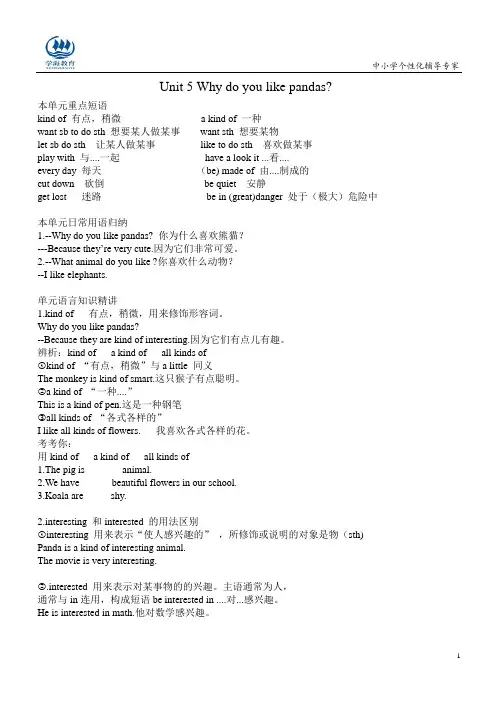
Unit 5 Why do you like pandas?本单元重点短语kind of 有点,稍微 a kind of 一种want sb to do sth 想要某人做某事want sth 想要某物let sb do sth 让某人做某事like to do sth 喜欢做某事play with 与....一起have a look it ...看....every day 每天(be) made of 由....制成的cut down 砍倒be quiet 安静get lost 迷路be in (great)danger 处于(极大)危险中本单元日常用语归纳1.--Why do you like pandas? 你为什么喜欢熊猫?---Because they’re very cute.因为它们非常可爱。
2.--What animal do you like ?你喜欢什么动物?--I like elephants.单元语言知识精讲1.kind of 有点,稍微,用来修饰形容词。
Why do you like pandas?--Because they are kind of interesting.因为它们有点儿有趣。
辨析:kind of a kind of all kinds of①kind of “有点,稍微”与a little 同义The monkey is kind of smart.这只猴子有点聪明。
②a kind of “一种....”This is a kind of pen.这是一种钢笔③all kinds of “各式各样的”I like all kinds of flowers. 我喜欢各式各样的花。
考考你:用kind of a kind of all kinds of1.The pig is _______animal.2.We have ______beautiful flowers in our school.3.Koala are _____shy.2.interesting 和interested 的用法区别①interesting 用来表示“使人感兴趣的”,所修饰或说明的对象是物(sth) Panda is a kind of interesting animal.The movie is very interesting.②.interested 用来表示对某事物的的兴趣。

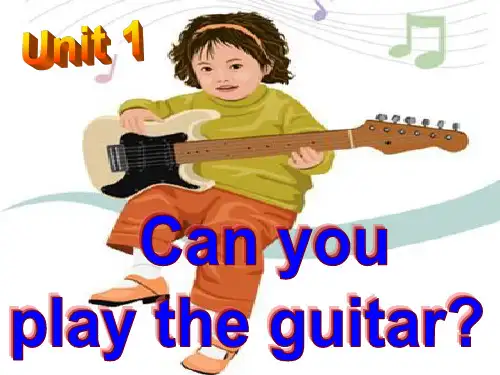
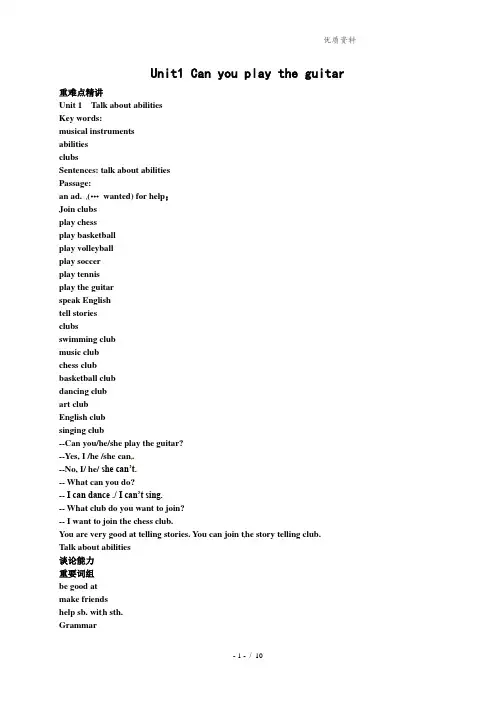
Unit1 Can you play the guitar重难点精讲Unit 1 Talk about abilitiesKey words:musical instrumentsabilitiesclubsSentences: talk about abilitiesPassage:an ad. (…wanted) for help;Join clubsplay chessplay basketballplay volleyballplay soccerplay tennisplay the guitarspeak Englishtell storiesclubsswimming clubmusic clubchess clubbasketball clubdancing clubart clubEnglish clubsinging club--Can you/he/she play the guitar?--Yes, I /he /she can.--No, I/ he/ she can’t.-- What can you do?-- I can dance ./ I can’t sing.-- What club do you want to join?-- I want to join the chess club.You are very good at telling stories. Y ou can join the story telling club.Talk about abilities谈论能力重要词组be good atmake friendshelp sb. with sth.Grammar情态动词can的用法play + the + 乐器play + 运动器材Writing假如你是Lily, 你们学校需要招聘音乐志愿者教师去帮助小学生,请你写一篇招聘广告,以吸引更多的志愿者加入。
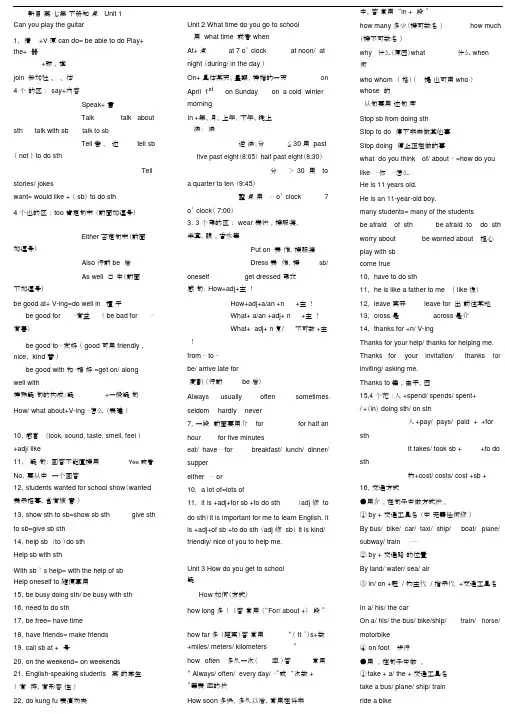
新目英七年下册知点Unit 1Can you play the guitar1,情 +V 原 can do= be able to do Play+ the+ 器+球,棋join 参加社、、体4 个的区: say+内容Speak+言Talk talk about sth talk with sb talk to sbTell 告,述tell sb ( not ) to do sthTell stories/ jokeswant= would like + ( sb) to do sth4 个也的区: too 肯定句末(前面加逗号)Either 否定句末(前面加逗号)Also 行前 be 后As well 口中(前面不加逗号)be good at+ V-ing=do well in擅于be good for⋯有益(be bad for⋯有害)be good to ⋯友好( good 可用 friendly ,nice, kind 替)be good with 和⋯相好 =get on/ alongwell with特殊疑句的构成:疑+一般疑句How/ what about+V-ing ⋯怎么(表建)10,感官(look, sound, taste, smell, feel )+adj/ like11,疑句:回答不能直接用Yes 或者No,要从中一个回答12,students wanted for school show(wanted 表示招募,含有被意)13,show sth to sb=show sb sth give sth to sb=give sb sth14,help sb (to )do sthHelp sb with sthWith sb ’ s help= with the help of sbHelp oneself to 随便享用15,be busy doing sth/ be busy with sth16,need to do sth17,be free= have time18,have friends= make friends19,call sb at +号20,on the weekend= on weekends21,English-speaking students 英的学生(有符,有形容性)22,do kung fu 表演功夫Unit 2 What time do you go to school用 what time 或者 whenAt+点at 7 o’ clock at noon/ atnight (during/ in the day )On+ 具体某天、星期、特指的一天onApril 1st on Sunday on a cold wintermorningIn +年、月、上午、下午、晚上法:法逆法:分≤ 30 用 pastfive past eight(8:05) half past eight(8:30)分>30用toa quarter to ten (9:45)整点用⋯o’ clock7o’ clock( 7:00)3,3 个穿的区: wear 表状,接服装、手套、眼、香水等Put on 表作,接服装Dress 表作,接sb/oneself get dressed 穿衣感句: How+adj+主!How+adj+a/an +n+主!What+ a/an +adj+ n+主!What+ adj+ n 复/不可数+主!from ⋯ to ⋯be/ arrive late for度副(行前be 后)Always usually often sometimesseldom hardly never7,一段前面要用介 for for half anhour for five minuteseat/ have ⋯ for breakfast/ lunch/ dinner/suppereither ⋯ or10, a lot of=lots of11, it is +adj+for sb +to do sth (adj 修 todo sth)It is important for me to learn English. itis +adj+of sb +to do sth (adj 修 sb) It is kind/friendly/ nice of you to help me.Unit 3 How do you get to school疑How 如何(方式)how long 多()答常用(“For/ about +)段”how far 多(距离)答常用“(It’)s+数+miles/ meters/ kilometers”how often多久一次(率)答常用“ Always/ often/ every day/ ⋯”或“次数 +”等表率的状How soon 多快,多久以后,常用在将来中。
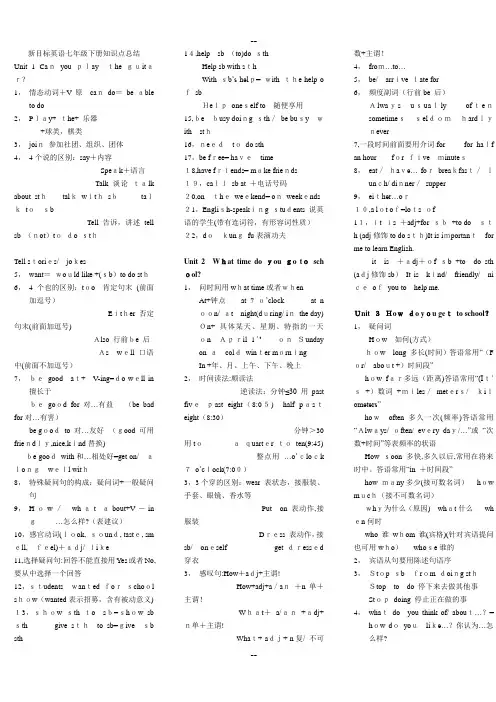
新目标英语七年级下册知识点总结Unit 1 Canyou playthe guitar?1,情态动词+V原cando=be able to do2,Play+ the+ 乐器+球类,棋类3,join参加社团、组织、团体4,4个说的区别:say+内容Speak+语言Talk 谈论talk about sthtalkwithsbtalktosbTell 告诉,讲述tell sb (not)todo sthTell stories/jokes5,want=would like +(sb)to do sth6,4个也的区别:too肯定句末(前面加逗号)Either否定句末(前面加逗号)Also 行前be 后As well 口语中(前面不加逗号)7,begood at+V-ing=do well in 擅长于begood for 对…有益(be bad for对…有害)be goodto 对…友好(good 可用friendly,nice,kind替换)be goodwith和…相处好=get on/alongwell with8,特殊疑问句的构成:疑问词+一般疑问句9,How/what about+V-in g…怎么样?(表建议)10,感官动词(look, sound, taste, sm ell,feel)+adj/ like11,选择疑问句:回答不能直接用Yes或者No,要从中选择一个回答12,studentswanted forschool show(wanted表示招募,含有被动意义) 13,show sth to sb=show sb sth give sthto sb=givesb sth 14,help sb (to)do sthHelp sb with sthWith sb’s help= with the help ofsbHelponeself to随便享用15,bebusy doing sth/be busywith sth16,needtodo sth17,be free= havetime18,have friends= make friends19,callsb at +电话号码20,ontheweekend= onweekends21,English-speaking students 说英语的学生(带有连词符,有形容词性质)22,dokungfu表演功夫Unit 2What time do you go toschool?1,问时间用what time或者whenAt+钟点at 7 o’clock at noon/ at night(during/ inthe day)On+ 具体某天、星期、特指的一天onApril 1stonSundayon acoldwinter morningIn +年、月、上午、下午、晚上2,时间读法:顺读法逆读法:分钟≤30用pastfivepast eight(8:05)half pasteight(8:30)分钟>30用toaquarter toten(9:45)整点用…o’clock7o’clock(7:00)3,3个穿的区别:wear 表状态,接服装、手套、眼镜、香水等Put on 表动作,接服装Dress 表动作,接sb/oneself get dressed穿衣3,感叹句:How+adj+主谓!How+adj+a/an+n单+主谓!What+a/an+adj+n单+主谓!What+ adj+ n复/ 不可数+主谓!4,from…to…5,be/arrive late for6,频度副词(行前be 后)Always usually oftensometimesseldomhardlynever7,一段时间前面要用介词for for halfan hour for fiveminutes8,eat/have… forbreakfast/lunch/ dinner/supper9,either…or10,a lot of=lots of11,it is +adj+for sb+to dosth (adj修饰to do sth)It is importantforme to learn English.it is+adj+of sb +to do sth(adj修饰sb)It is kind/friendly/niceofyou to help me.Unit 3Howdo you getto school?1,疑问词How如何(方式)how long 多长(时间)答语常用“(For/about +)时间段”how far多远(距离)答语常用“(It’s+)数词+miles/meters/kilometers”howoften多久一次(频率)答语常用“Always/ often/ every day/…”或“次数+时间”等表频率的状语How soon多快,多久以后,常用在将来时中。

Unit8 Is there a post office near here?1.Is there a hospital near here?辨析: near&next tonear:(prep) 在...附近(adj)近的Eg:There is a park near my house.It is near from my house to school.next to:(介词短语)贴近;紧靠相当于close to/beside Eg:The park is next to my school.2.The pay phone is in front of the library.辨析:in front of &in the front ofin front of :(外部)在...前面in the front of :(内部) 在...前面Eg:The car is in front of the house.The driver is sitting in front of the car.辨析:before&in front of(1)表示位置关系:在...之前,二者可以通用Eg:She sits before /in front of me.(2)表示时间、次序时,只能用before.Eg:The worker must finish the task before Wednesday.3.The pay phone is behind the library.辨析:behind&afterbehind:在...后面(位置关系)in front of (反义词)Eg:The hospital is behind the post office.after :在...之后(时间、次序)Eg:He wants to play games after 5p.m.4.Is there a bank around here?around:(prep)在...周围(adv)在各处;到处;环绕Eg:There are some beautiful flowers around the garden.My dream is to travel around the world.around:大约相当于aboutEg:There are around 70 students in our class.5.Is it next to the police station?police station:警察局Police:(集体名词)作主语时,谓语动词用复数形式Eg:The police are ing.注意: “一名警察”不能写成:a police应该写成:a policeman/a policewoman对应复数形式为:some policemen /some policewomen6.Just go along Bridge Street and turn left/right when you see the library.along:(prep)沿着常与walk/go连用,沿着...走Eg:Walk /Go along the street and you will find the library.along:(adv) 构成短语:all along 一直 e along 与...一起来get along with 与...相处left/right (adv/n /adj) 向左/右;左/右边;左/右边的turn left/right (中间不要冠词the)turn to left/right (此时为n)on the left/right 在左/右边on one’s left/right 在某人的左右边in his left/right 在他的左/右手里7.There is a zoo in my neighborhood.in the neighborhood 在附近= near herein the neighborhood of 在...附近Eg:There is a supermarket in the neighborhood of the bank.构词法:neighbor(邻居)+hood=neighborhood(街区)child+hood=childhood(童年)8.I like to spend time there on weekends.辨析:spend cost pay takeSpend:(主语是人)花费(1)人+spend+时间/金钱+on sth. 某人在...上花费时间/金钱(2)人+spend+时间/金钱+(in) doing sth. 某人花费时间/金钱做某事Eg:He spent fifty yuan on the new book.My sister spends two hours watching TV.Cost:(主语是物) 花费物+cost+(人)+金钱某物花了某人多少钱Eg:The book costs her fifty yuan .Pay:(主语是人)支付人+pay +(人)+金钱+for sth. 某人(向某人)支付多少钱买某物Eg:She pays fifty yuan for the book.Take:常用it作形式主语It takes sb. +时间+to do sth. 花费某人时间做某事Eg:It takes me two days to finish my work.或:I spend two days finishing my work.9.I love to watch the monkeys climbing around.watch/see/hear sb.+ do sth. 强调动作的整个过程(动作已经发生) watch/see/hear sb.+ doing sth. 强调动作正在进行Eg:I often hear him sing that song.I hear him singing that song.I see a girl draw the picture under a tree.I see a girl drawing the picture under a tree.10.To get to the park,you just have to cross Center Street.To get to the park:动词不定式位于句首,作目的状语。
Unit7 It’s raining!1.It’s raining!rain:v下雨;n雨(不可数名词)注意:作为不可数名词时,当它前面有heavy(大)/light(小)修饰时,形容词前要加冠词aEg:There was a heavy rain this morning.2.How’s the weather in Shanghai?对天气提问的句型:How’s the weather (in+地点)?What’s the weather like(in+地点)?答语:It is+形容词.(表天气)Eg:---How’s the weather in Wuhan?---It’s sunny.---What’s the weather like in Wuhan?---It’s sunny.由“名词+y”构成的天气形容词Eg:cloud(n云)---cloudy(adj 多云的)rain(n 雨)---rainy(adj 下雨的)wind(n 风)---windy(adj 有风的)sun(n 太阳)---sunny(adj 晴朗的)snow(n 雪)---snowy(adj 有雪的)storm(n 暴风雨)---stormy(adj 有暴风雨的)shower(n 阵雨)---showery(adj 有阵雨的)weather为不可数名词天气与weather相关的短语weather forecast/report 天气预报weatherman天气预报员感叹句:(1).What+(a/an)+adj+n+主谓!(2)How+adj/adv+主谓!Eg:What a fine day it is!How fine the day is!多么好的天气啊!3.Aunt Sally is cooking.cook:v 烹饪;煮n厨师cooker:厨具Eg:The cook is cooking with some cookers.用法:cook sth.for sb./ cook sb. sth.为某人做饭(同buy的用法)Eg:My mom is cooking a big dinner for us.My mom is cooking us a big dinner. 妈妈正在为我们做丰盛的晚餐4.How’s it going? 最近怎么样?询问对方近况/事情进展情况,可跟with sb./sth.相当于How is everything(going)?该用语的常见答语有:Great!Pretty good!(相当好) Not bad!(还不错)Just so-so!(一般般/马马虎虎) Terrible!(糟糕透了) Everything is going well.(一切都好)Eg:---How’s it going with your tests?--- Pretty good!注意:How are you doing? 你最近好吗?What are you doing? 你正在做什么?5.Can I take a message for him?message:(可数名词)消息;信息take a message for sb. 为某人捎个口信拓展与message相关的常用短语:take a message to sb.捎信给某人send a text message to sb.给某人发短信leave a message 留言6.Could you just tell him to call me back?could:(情态动词)能;可以(语气上比can委婉、客气)当could用于一般疑问句时,作肯定回答要用:Yes,...can. 也可用:Sure/Certainly/Yes,please.Eg:-Could you help me carry the box?-Sure.call sb.back 给某人回电话拓展与back相关短语come back 回来go back回去bring back 带回来take back 收回fight back 回击7.Sure,no problem.no problem没问题(道谢、道歉、询问能力等语境中)Eg:(1)-Thank you.-No problem.(没什么)(2)-I’m sorry.-No problem.(没关系)(3)-Can you do it?-No problem.(没问题)8.I’m having a great time visiting my aunt in Canada. visit: v 拜访,参观visit+sb. 拜访某人visit+地点参观某地visit: n 逗留、游览、参观常用短语:go on a visit to...去...参观pay a visit to sb.去某人处做客on a visit to去...游览visitor 访问者;参观者Canada(加拿大)---Canadian(加拿大人/加拿大人的) America(美国)---American(美国人/美国的)Russia(俄罗斯)---Russian(俄罗斯人/俄罗斯的)Europe(欧洲)---European(欧洲人/欧洲人的)9.Are you studying hard,or are you having fun?hard:adv 努力地;艰难地;猛烈地/ adj 坚硬的;困难的Eg:Young people should work hard.(努力地)It’s raining hard now.(猛烈地)The stones are too hard.(坚硬的)The maths problem is kind of hard.(困难的)注意:hard 本身有adv词性,hardly(adv)几乎不;几乎没有10.My family and and I are on a vacation in the mountains.on a vacation:在度假拓展:与vacation相关的短语on vacation 在度假take a vacation 度假Eg:Miss Yi is on vacation now.I will go to Yunnan to take a vacation.辨析:vacation,holiday,festival,leave,offvacation:学校、机关等假期(时间一般比较长)(美国)holiday:泛指休息日,常指较长时间的休假(英国)festival:指悠久历史的传统节日leave:(n)请假(被批准后离开一段时间)Eg:He asked for a six months’ leave.off:常用结构:have+时间+off 请假,休假Eg:I have half a month off every day.一般现在时VS现在进行时区别11.It’s hot in your country now,isn’t it?反意疑问句:由两部分构成:陈述句+附加问句遵循:前肯后否,前否后肯两部分的时态要保持一致,附加问句部分一般由“助动词/系动词/情态动词的肯定或否定形式+代词”,否定形式通常使用缩写形式Eg:It’s raining now,isn’t it?(正在下雨,不是吗?)She likes playing games,doesn’t she?(她喜欢打游戏,不是吗?)He can’t play basketball,can he?(他不会打篮球,是吗?)当反意疑问句的主句部分含有表示否定含义的never、little、few、no、hardly等词时,附加问句则用肯定形式Eg:They never watch TV on weekends, do they?There is little milk in the fridge,is there?My father hardly smokes,does he?反意疑问句的回答:(1)Yes,+肯定回答. No,+否定回答Eg: -She is a doctor, isn’t she?-Yes,she is. No,she isn’t.(2)如果前面的陈述部分为否定句的反意疑问句,回答时yes/no的翻译与通常情况正好相反-She isn’t a doctor, is she?(她不是医生,对吗?)-Yes,she is. / No,she isn’t.(不,她是。
七年级下册Unit 3 讲义2一、根据句意及首字母或汉语提示完成单词.1.We will g_____ to Beijing tomorrow.2.I take a _______ (地铁) to work every day.3.My grandparents l______ in the countryside (乡村).4.There is a ______ (桥) over the river.5.I’m a_______ that he can’t pass the exam (通过考试).6.My _______ (梦想) will come true one day.7.These little boys c______ the street (街道) carefully.8.There are _______ (许多) trees on the both sides of the street.9.Lily sits b______ her mother and father.10.There are twelve months in a ______ (年).二、用所给词的适当形式填空.1.It takes me twenty minutes (分) _______ (finish) my homework.2.Chocolate isn’t a _______ (health) food.3.She ______ (go) to school by bike every day.4.There are two _______ (hundred) books in the box.5.He is thinking of _____ (finish) his work quickly.6.There are five ______ (bus) in our school.7.I’m afraid ______ (go) out at night.8.Thanks for ______ (help) me.9.It is difficult for me ______ (learn) math.10.The old man is walking ______ (cross) the street slowly.三、单项选择( )1. Walking after dinner is _____ good exercise.A.aB. anC. theD. /( )2. There are ______ people in the hall (大厅).A.two hundreds ofB. two hundredsC. hundred ofD. two hundred ( )3. -- ______ is it from your home to the bus station? -- About five kilometers.A.How longB. How muchC. How manyD. How far ( )4. _____ is easy ______ in the pool (水池).A.That; swimB. It; to swimC. That; to swimD. It; swim ( )5. -- How do you go to school, Tony?-- I go to school ______.A.by a busB. take a busC. by busD. in a bus( )6. ____ takes him one hour _____ the room.A.It; to cleanB. It; cleaningC. That; to cleanD. That; cleaning ( )7. We go to school ______ Monday _____ Friday.A.between; andB. in; andC. from; toD. from; on ( )8. Let’s ______ the bridge together.A.acrossB. crossC. to crossD. to across( )9. She is an _______ girl.A.eight - year - oldB. eight - years - oldC. eight years oldD. eight year old( )10. -- Can we get to school at 7: 30?--______A.Have a good dayB. How about youC. Sorry.D. I’m not sure.( )11. Thank you for ______ me the good news.A. tellB. to tellC. tellingD. tells( )12. There are ______ flowers in the garden, but there isn’t ______ water near here.A. many; manyB. much; muchC. many; muchD. much; many( )13. What do you ______ the transportation(交通) in your city?A. think ofB. think aboutC. think overD. think out( )14. _______ does it take you to finish _______ the book?A. How long; to readB. How soon; to read C How often; reading D. How long; reading( )15. It takes ______ 20 minutes ______ English every day.A. I; to readB. us; readC. me; to readD. them; read四、翻译句子1.总有一天我的梦想会实现。
Unit11 How was your school trip?1.fed chickensfed 为feed的过去式译为:饲养、喂养用法:feed...on... 用...喂养...feed...to...把...喂给...feed on ...(动物)以...为主食Eg:I sometimes feed the carrot to the rabbit.She feeds the dog on meat.The horse feeds on grass.2.I saw quite a lot.a lot:许多,大量(此处作宾语)还可作表语Eg:There is a lot to do.辨析:a lot,a lot of, lots ofa lot of:许多;大量=lots of (后接可数名词复数/不可数名词) 辨析:quite &veryquite:(adv)十分,非常(修饰adj/adv)very:(adv)很,非常语气较quite重(修饰adj/adv)注意:quite &very与不定冠词连用时的位置不同:a+very+adj+n quite+a(n)+adj+nEg:a very handsome boy quite a handsome boya very interesting story quite an interesting storyEg:She sings quite well. He is quite a kind boy.This kind of fruit is very healthy. Thank you very much.3.Did you learn anything?辨析:anything&somethinganything:(不定代词)任何事物;某事物(常用于否定句/疑问句中) something:(不定代词)某事(常用于肯定句中) 但是在表示请求、建议、或征求意见的疑问句中常用something注意:(1)adj修饰不定代词,要位于其后(2)不定代词作主语时,谓语动词用单数形式(3)补充其他不定代词some any no every/body thing oneEg:There isn’t anything wrong.There is something wrong with my computer.4.The farmer showed Carol around the farm.farmer:(n)农民farm:(n)农场;(v)干农活farming:(不可数n)农事Eg:The farmers are working on the farm,and there is too much farming.show sb.around...带某人到处参观...Eg:The guide shows us around the museum.与show相关的短语:show sb.sth=show sth.to sb.给...看展示on show 展览show off 炫耀show up出现5.The farmers don’t grow apples.grow:(vt)种植;栽培(vi)生长;发育Eg:Farmers in the south of China mainly grow rice.Everything begins to grow in spring.短语:grow up成长,长大grow into成长为;发展成(由一种情况变成另外一种情况)Eg:I want to be a guide when I grow up.She grows into a lovely girl.辨析:grow&plantgrow: 种植(强调过程/状态)plant:(v)种植(仅表示栽入土中,表示动作)(n)植物Eg:The farmers grow a lot of trees every year.The farmers plant lots of trees every year.There are many different plants in the garden.6....we worried it would rain.worry:(vt)担心;担忧后常接宾语从句Eg:His parents worry that their child will sick.(vt)使担心;使发愁(常接sb.作宾语)Eg:The naughty boy worries his parents.worry about sb./sth.=be worried about sb./sth. 担心某人/某事Eg:Don’t worry about me ./Don’t be worried about me.7.Luckily,it didn’t,and the sun came out again.(1)luckily(adv)幸运地常用于句首,用逗号隔开unluckily不幸地unfortunately fortunate(adj)幸运的fortunately(adv)幸运地以辅音字母+y结尾的形容词变成副词的方法:改y为i再加ly Eg:happy lucky busy angry easy(2)sun moon earth star 都是世界上独一无二的事物,前面必须加the(3)come out出来;发芽;开花;出版与come相关的短语:come from来自come on加油;快点come back 回来come down 下来come in 进来come up with 提出;想出;赶上come across遇到8.expensive/cheapexpensive/cheap只能形容事物的贵贱;当谈论价格(price)时,只能用high/lowEg:The pen is cheap.=The price of the pen is low.9.All in all,it was an exciting day.all in all:总的来说;总之in a word:简言之in short:总之Eg:All in all, it’s good for you to do more exercise.辨析:all in all, in all,at allall in all:总的来说(常用于句首)eg:All in all, we had a good time. in all:总共;合计(句首/句末)eg:There are fifty students in all.at all:根本常用于“not at all”根本不Eg:He doesn’t like apples at all.与all相关的短语:all the time 一直after all 毕竟10.I didn’t like the trip at all.Not at all 用于回答感谢/道歉Eg:---Thank you very much.---Not at all.其它的回答:It’s my pleasure. It’s a pleasure. No problem.You’re welcome. That’s all right. That’s OK.一般过去时态含义:表示过去某个时间发生的动作或存在的状态,也表示过去经常或反复发生的动作。
人教版英语七年级下册U3 How do you get to school?同步知识精编讲义一、同步知识梳理一、词汇WordsSection A词汇1. One hundred and five 一百零五(P14)Hundred 数词,意为“百”,当前面有具体数字时,其后不加-s,不和of连用。
例:There are about eight hundred students in our school. 我们学校大约有80名学生。
【拓展】①若表示一个不确定的数字,前面没有具体数字时,其后要加-s,且与of连用。
hundreds of意为“数百的;成百上千的”There are hundreds of people in the restaurant. 这个餐馆里有数百人。
②与hundred用法类似的单词还有thousand“千”, million“百万”, billion“十亿”练习:(2014.山东东营)When he arrived at the airport, Lee Minho found that fans were waiting for him there.A. hundredB. hundredsC. hundred ofD. hundreds of解析:D hundred前有具体数字修饰时,表示确切数目,hundred前无具体数字修饰时,常用hundreds, 且与of 连用,此时表示概数。
“当李敏镐到达机场时,他发现数百粉丝正在那里等着他”。
2. I ride it to school every day. 我每天骑着它上学。
①ride此处作及物动词,意为“骑”,后面可接bike, horse, motorbike.等例:He rides a bike to school.= He goes to school by bike. 他骑自行车去学校。
② every 形容词,意为“每一,每个”,其后接单数可数名词,every day意为“每天”,是一般现在时的时间状语。
新目标英语七年级下册知识点总结Unit 1 Can you play the guitar?1,情态动词+V原can do= be able to do 2,Play+ the+ 乐器+球类,棋类3,join 参加社团、组织、团体4,4个说的区别:say+内容Speak+语言Talk 谈论talk about sth talk with sb talk to sbTell 告诉,讲述tell sb (not)to do sthTell stories/ jokes5,want= would like +(sb)to do sth6,4个也的区别:too 肯定句末(前面加逗号)Either否定句末(前面加逗号)Also 行前be 后As well 口语中(前面不加逗号)7,be good at+ V-ing=do well in 擅长于be good for 对…有益(be bad for对…有害)be good to 对…友好(good 可用friendly,nice,kind替换)be good with和…相处好=get on/ along well with8,特殊疑问句的构成:疑问词+一般疑问句9,How/ what about+V-ing …怎么样?(表建议)10,感官动词(look, sound, taste, smell, feel)+adj/ like11,选择疑问句:回答不能直接用Yes或者No,要从中选择一个回答12,students wanted for school show(wanted 表示招募,含有被动意义)13,show sth to sb=show sb sth give sth to sb=give sb sth14,help sb (to)do sthHelp sb with sthWith sb’s help= with the help of sbHelp oneself to 随便享用15,be busy doing sth/ be busy with sth16,need to do sth17,be free= have time18,have friends= make friends19,call sb at +电话号码20,on the weekend= on weekends 21,English-speaking students 说英语的学生(带有连词符,有形容词性质)22,do kung fu表演功夫Unit 2 What time do you go to school?1,问时间用what time或者whenAt+钟点at 7 o’clock at noon/at night(during/ in the day)On+ 具体某天、星期、特指的一天on April 1st on Sunday on a coldwinter morningIn +年、月、上午、下午、晚上2,时间读法:顺读法逆读法:分钟≤30用pastfive past eight(8:05)half past eight(8:30)分钟>30用toa quarter to ten(9:45)整点用…o’clock 7o’clock(7:00)3,3个穿的区别:wear 表状态,接服装、手套、眼镜、香水等Put on 表动作,接服装Dress 表动作,接sb/oneself get dressed穿衣3,感叹句:How+adj+主谓!How+adj+a/an +n单+主谓!What+ a/an +adj+ n单+主谓!What+ adj+ n复/ 不可数+主谓!4,from…to…5,be/ arrive late for6,频度副词(行前be 后)Always usually often sometimesseldom hardly never7,一段时间前面要用介词for for half anhour for five minutes8,eat/ have… for breakfast/ lunch/ dinner/supper9,either…or10,a lot of=lots of11,it is +adj+for sb +to do sth (adj修饰to dosth)It is important for me to learn English.it is +adj+of sb +to do sth (adj修饰sb)It is kind/ friendly/ nice of you to help me.Unit 3 How do you get to school?1,疑问词How 如何(方式)how long 多长(时间)答语常用“(For/about +)时间段”how far多远(距离)答语常用“(It’s +)数词+miles/ meters/ kilometers”how often多久一次(频率)答语常用“Always/ often/ every day/…”或“次数+时间”等表频率的状语How soon多快,多久以后,常用在将来时中。
答语常用“in +时间段”how many多少(接可数名词)howmuch(接不可数名词)why为什么(原因)what什么when何时who谁whom谁(宾格)(针对宾语提问也可用who)whose谁的2,宾语从句要用陈述句语序3,Stop sb from doing sthStop to do 停下来去做其他事Stop doing 停止正在做的事4,what do you think of/ about…?= howdo you like…?你认为…怎么样?5,He is 11 years old.He is an 11-year-old boy.6,many students= many of the students7,be afraid of sth be afraid to do sthworry about be worried about 担心8,play with sb9,come true10,have to do sth11,he is like a father to me (like像)12,leave离开leave for 出发前往某地13,cross 是动词across是介词14,thanks for +n/ V-ingThanks for your help/ thanks for helpingme.Thanks for your invitation/ thanks forinviting/ asking me.Thanks to幸亏,由于,因为15,4个花费:人+spend/ spends/ spent+时间/钱+(in)doing sth/ on sth人+pay/ pays/ paid +钱+for sthIt takes/ took sb +时间+to dosth物+cost/ costs/ cost +sb +钱16,交通方式●用介词。
在句子中做方式状语。
①by +交通工具名词(中间无需任何修饰)By bus/ bike/ car/ taxi/ ship/ boat/ plane/subway/ train……②by +交通路线的位置By land/ water/ sea/ air③in/ on +冠词/物主代词/指示代词+交通工具名词In a/ his/ the carOn a/ his/ the bus/ bike/ship/ train/ horse/ motorbike④on foot 步行●用动词。
在句子中做谓语。
①take + a/ the +交通工具名词take a bus/ plane/ ship/ trainride a bike②walk/ drive/ ride/ fly to……(后面接here,there,home等地点副词时,省略介词to。
)如步行回家:walk home 17,名词所有格一般情况加’s Tom’s pen以s结尾加’ the teachers’ office ten days’ holiday表示几个人共同拥有,在最后一个名词后加’s Mike and John’s desk表示每个人各自拥有,在每个名词后加’s Mike’s and John’s desksUnit 4 Don’t eat in class.1,祈使句(变否定在句首+don’t)Be型(be +表语),否定形式:don’t + be +表语Be quiet,please. Don’t be late!Do型(实义动词+其他),否定形式:don’t +实义动词+其他Come here,please. Don’t play football here.Let型(let sb do sth),否定形式:don’t + let sb do sth或者let sb not do sthNo+n/ V-ing No photos /mobile;No parking/ smoking/ spitting/ talking/ picking of flowers2,in class在课堂上in the classroom 在教室3,be on time准时4,listen to music5,(have a)fight with sb7,eat outside8,Must 与have to(1)must 表示说话人主观上的看法,意为“必须”。
have to 表示客观的需要或责任,意为“不得不,必须”,后接动词原词。
(2)must没有人称,时态和数的变化Have to 有人称,数,时态的变化,其第三人称单数形式为has to ,过去式为had to. 构成否定句或疑问句时借助动词do/ does。
(3)have to的否定式是needn’t=don’t / doesn’t have to (不必要);must的否定式是must not/ mustn’t(一定不能,不允许)。
9,Some of…10,bring…to…11,practice (doing)sth12,wash/ do the dishes13,on school days/ nights14,break/ follow(obey)the rules15,Be strict with sb/ oneself be strictin sth对……严格。
16,too many“太多”修饰可数名词复数too much“太多”修饰不可数名词much too“实在太”修饰形容词或副词17,make one’s/ the bed18,get to, arrive in/at, reach,到达(如果后面接地点的副词home,here或there ,就不用介词in ,at, to)19,remember/ forget+to do要做+doing做过20,have fun,enjoy oneself,have a good/great/ wonderful time+V-ingUnit 5 Why do you like pandas?1,回答why的提问要用because2,Kind of 相当于副词,修饰形容词或副词,意为“稍微,有点”,与a little/ bit 相近A kind of 意为“一种”,some kinds of 意为“几种”,all kinds of 意为“各种各样的”。